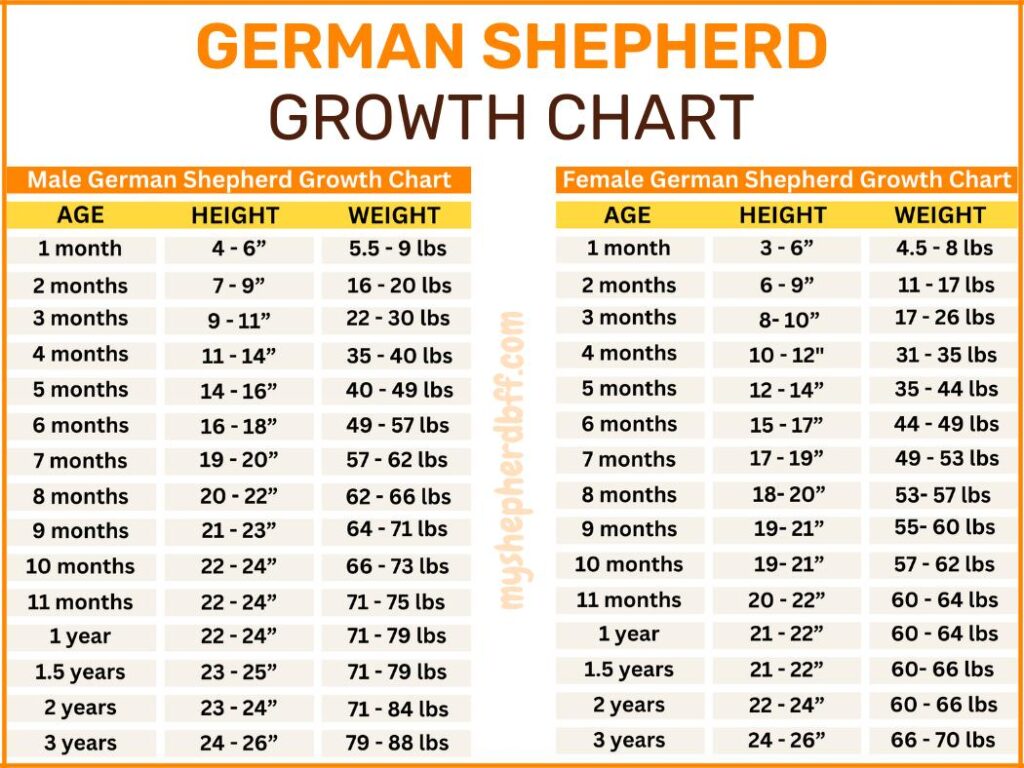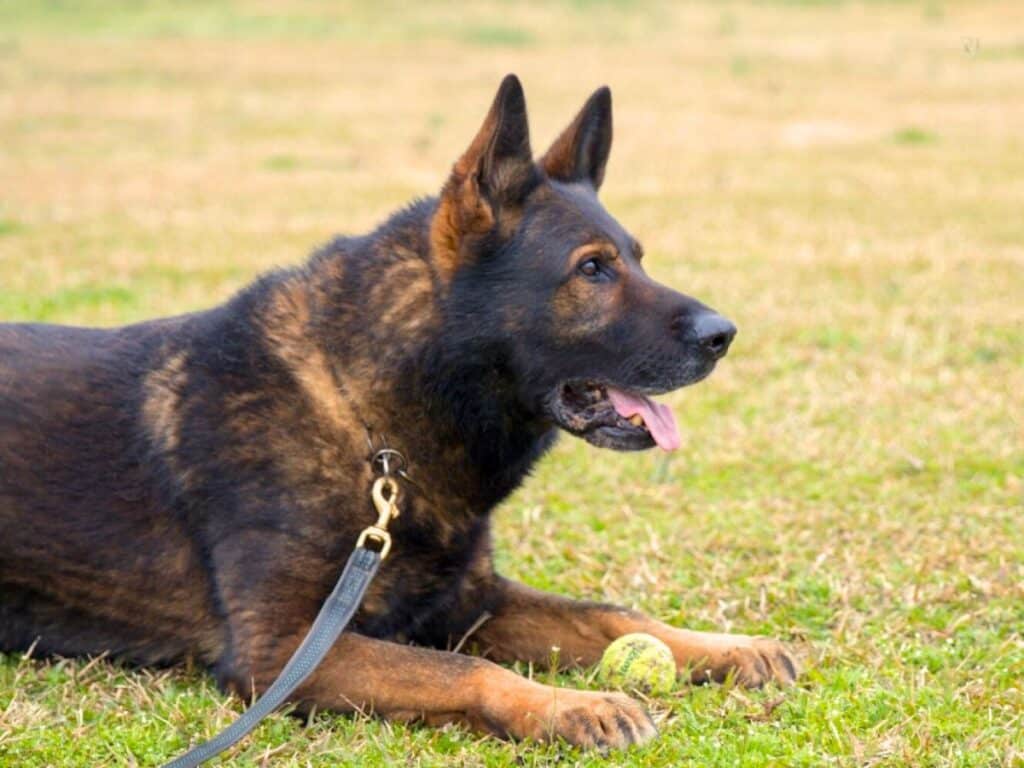Is your 14-week-old German Shepherd pup becoming a handful? Known for their intelligence and loyalty, German Shepherds require special attention during this critical stage of development.
Whether it’s training, socialization, or nutrition, every aspect plays a vital role in shaping your furry friend’s future.
In this guide, we’ll delve into the specific requirements of a 3-and-a-half-month-old German Shepherd puppy and provide valuable insights to help you navigate through this important phase.
14 Week Old German Shepherd Key Traits
Your German Shepherd puppy at this age is an energetic and inquisitive canine who is in the midst of a crucial stage of growth and development.
The table below outlines key details, behaviors, and characteristics that define the 14-week milestone, providing valuable insights into aspects such as size, weight, ears, and emerging traits.
| Height | 9 – 14 inches, Medium-sized, growing rapidly |
| Weight | Typically around 20-30 pounds |
| Coat | Dense double coat, may be fluffy |
| Ears | May still be floppy, starting to stand occasionally |
| Eyes | Bright and alert |
| Teeth | Baby teeth may be falling out, adult teeth emerging |
| Behavior | High energy, playful, and curious |
| Training | Basic commands like sit, stay, and recall |
| Socialization | Developing social skills, may be curious about other animals and people |
| Sleep | 18 – 20 hours/day, Naps throughout the day, sleeps deeply at night |
| Feeding | 2 -3 cups of puppy food spread over 3 – 4 meals per day. |
| Health Care | Must have received initial vaccinations and deworming |
| Behavioral Issues | Possible teething-related chewing and nipping, starting to explore surroundings |
| House Training | Making progress, may have occasional accidents |

14 Week Old German Shepherd Weight
At 14 weeks old, the average weight of a German Shepherd puppy can range from 20 to 30 pounds. However, it’s important to note that individual puppies may vary in weight depending on factors such as genetics, diet, and exercise.
It’s always a good idea to consult with a veterinarian to ensure your German Shepherd puppy is growing at a healthy rate. Regular check-ups and monitoring their weight can help you track their development and make any necessary adjustments to their care.
How Big is a 14 Week Old German Shepherd?
At 14 weeks old, a German Shepherd puppy will typically weigh between 20-30 pounds and stand around 9 – 14 inches tall at the shoulder. However, it’s important to remember that each puppy is unique and may vary in size.
German Shepherds undergo rapid growth during their first year. This period is crucial for their overall development and sets the foundation for their adult size and strength.
At this stage, they are experiencing significant physical changes as they transition from a puppy to an adolescent dog.
You can refer to the following German Shepherd Growth Chart that visually breaks down the key milestones in your puppy’s growth, providing insights into their average weight, height, and developmental stages in the coming weeks and months.

If you want to learn more about how much your furry friend will grow and weigh as they mature, you can check out my article – German Shepherd Growth & Weight Chart By Age.

Factors Affecting Growth Rate
The growth rate of a German Shepherd puppy can be influenced by several factors.
- Genetics: Puppies with parents who have a larger size and faster growth tend to grow at a faster rate themselves. (Study)
- Nutrition: Feeding the puppy high-quality puppy food that provides all the necessary nutrients, including proteins, vitamins, and minerals can help ensure proper growth.
- Exercise: Adequate physical activity helps to strengthen their muscles and bones, promoting healthy growth. However, it is important to avoid excessive exercise or strenuous activities that can strain their growing bodies.
- Age and Sex: Generally, puppies experience rapid growth during their first few months of life, and their growth rate gradually slows down as they reach adulthood. Male puppies tend to grow larger and at a slightly faster rate compared to females.
It is important to note that each German Shepherd puppy is unique, and their growth rate can vary even within the same litter.
14 Week Old German Shepherd Ears
At 14 weeks old, German Shepherd puppies are still in the midst of their ear development. During this stage, their ears may still be floppy or starting to stand up, depending on the individual puppy.

It is important to note that every puppy is different, and their ears may develop at different rates. Some German Shepherds may have fully erect ears by this age, while others may still have floppy ears that will eventually stand up as they grow older.
If your pup’s ears are still floppy at 14 weeks, there is no need to worry. Their ears will continue to develop and may eventually stand up on their own.
It is not uncommon for German Shepherds to have floppy ears until they are around 6 months old or even longer.
It’s important to be patient during this stage and avoid any unnecessary interventions. Trying to force your puppy’s ears to stand erect or using devices like tape or braces can potentially harm their delicate ears and cause discomfort.
Providing your puppy with appropriate chew toys and a balanced diet that includes essential nutrients like calcium and protein can support healthy ear development.
RELATED:
Feeding Your 14 Week Old German Shepherd Puppy
Feeding a German Shepherd puppy involves providing a balanced and nutritious diet to support their rapid growth and development.

How Much Should a 14 Week Old German Shepherd Eat?
A 14-week-old German Shepherd puppy should eat about 2 -3 cups of high-quality puppy food spread over 3 – 4 meals per day. The exact amount of food will depend on the individual puppy’s size, weight, and activity level.
It’s important to monitor your puppy’s weight and adjust the portion sizes accordingly. If they start gaining too much weight, you may need to slightly decrease the amount of food, and if they are not gaining enough weight, you may need to increase it.
Remember to consult with your veterinarian for personalized advice and to ensure you are meeting your puppy’s specific dietary needs.
RELATED: German Shepherd Puppy Feeding Chart By Age
Puppy Feeding Guidelines
Here are some general guidelines for feeding your growing German Shepherd puppy:
1. Choose a high-quality puppy food:
Look for a puppy food that is specifically formulated for large breed dogs like German Shepherds. These foods are designed to meet the nutritional needs of growing puppies and contain the right balance of protein, fat, and carbohydrates.
2. Follow the feeding guidelines:
The packaging of the puppy food will provide recommended daily feeding amounts based on your puppy’s weight. It’s important to follow these guidelines to ensure your puppy is getting the right amount of food.
3. Divide meals into multiple feedings:
Divide your pup’s daily food intake into three or four smaller meals. This helps prevent digestive issues and keeps their energy levels stable throughout the day.

4. Monitor your puppy’s weight:
It’s important to keep an eye on your puppy’s weight to ensure they are growing at a healthy rate. If you notice that your puppy is gaining too much weight or not gaining enough, adjust their food intake accordingly.
5. Avoid overfeeding:
While it may be tempting to give your puppy extra treats or table scraps, it’s important to avoid overfeeding.
Overfeeding can lead to obesity and other health problems later in life. Stick to the recommended feeding amounts and limit treats to training purposes.
6. Provide fresh water:
Make sure your puppy always has access to fresh, clean water. Hydration is important for their overall health and well-being.
RELATED: Do German Shepherds Drink a Lot of Water?
7. Consider Treats in Moderation:
Use treats sparingly and opt for healthy, puppy-friendly treats. Overdoing treats can contribute to excessive calorie intake.

14 Week Old German Shepherd Behavior
The behavior or temperament of a 14-week-old German Shepherd puppy is influenced by a combination of genetic factors, early socialization experiences, and individual personality traits. At this age, German Shepherd puppies are typically energetic, curious, and intelligent.
Here are some common temperament traits you might observe in your GSD pup at this age:
Playfulness: German Shepherd puppies are often playful and enjoy engaging in various interactive activities. They may show enthusiasm for toys, games, and exploration.
Curiosity: The puppy’s natural curiosity is at its peak during this stage. They may investigate their surroundings, sniffing and exploring to learn more about the environment.
Socialization: Socialization is crucial at this age. Puppies may show a friendly and outgoing demeanor towards people, other dogs, and new experiences. Early positive interactions help shape their social skills.
Intelligence: German Shepherds are known for their high intelligence, and you’ll likely notice your puppy picking up on commands and learning quickly. Training sessions can be enjoyable for both you and your pup.
Energy Level: At 14 weeks, German Shepherd puppies have bursts of energy but also need sufficient rest. They may engage in short bursts of playfulness followed by periods of napping.
Attachment: Puppies may begin to form strong bonds with their owners and show signs of attachment. They may seek attention, affection, and enjoy spending time with their human family members.
Alertness: German Shepherds are naturally alert and may display watchful behavior. This trait contributes to their reputation as excellent guard and protection dogs.
Teething Challenges: The puppy might be going through the teething stage, leading to a tendency to chew on things. Providing appropriate chew toys can help soothe their gums.
Independence: While puppies may seek attention and companionship, they may also display moments of independence. This is a normal part of their development as they learn to explore on their own.

Check out this video of a cute 14-week-old German Shepherd out in nature…
Training Your 14 Week Old German Shepherd
Training a German Shepherd puppy can be an exciting and rewarding experience. These intelligent and loyal dogs are known for their obedience and high trainability.
To effectively train your German Shepherd puppy, consider the following steps:
Start with the basics: Begin by teaching your puppy simple commands like “sit,” “stay,” and “come.” Use positive reinforcement, such as treats or praise, to reward them for good behavior.
RELATED: German Shepherd Training For Beginners
Short training sessions: Keep training sessions short and focused, usually no more than 5-10 minutes for puppies. Multiple short sessions throughout the day are more effective than one long session.
Establish a routine: Dogs thrive on consistency, so establish a regular training schedule. This will help your puppy understand what is expected of them and make training sessions more effective.
Socialize your puppy: Introduce your German Shepherd to different people, animals, and environments from a young age. This will help them become well-rounded and confident dogs.
RELATED: How To Socialize Your German Shepherd Puppy
Leash training: Introduce your puppy to a leash early on. Teach them to walk on a leash without pulling and respond to basic commands while on the leash.
RELATED: How To Stop a German Shepherd From Pulling on The Leash
Crate training: Crate training provides a safe space for your puppy and aids in-house training. Make the crate a positive environment with treats and toys.
RELATED: How to Crate Train a German Shepherd Puppy?

Distract from undesirable behavior: If your puppy engages in undesirable behavior, redirect their attention to an appropriate activity. Consistently rewarding positive behavior helps discourage negative habits.
RELATED: How To Discipline A German Shepherd Puppy
Use positive reinforcement: German Shepherds respond well to positive reinforcement techniques. Reward good behavior with treats, praise, or playtime to reinforce the desired actions.
Be patient and consistent: Training takes time and patience. Consistency is key, so make sure to use the same commands and rewards each time. Avoid getting frustrated and remember that every dog learns at their own pace.
Obedience classes: Consider enrolling your puppy in a puppy obedience class. These classes provide structured training sessions and opportunities for socialization with other puppies.
Remember, training a German Shepherd puppy is an ongoing process. It’s important to continue reinforcing good behavior throughout their life. With time, patience, and consistency, you’ll have a well-trained and obedient companion by your side.
RELATED: How To Potty Train a German Shepherd Puppy Easily
RELATED: Brain Training For German Shepherds

Exercising Your 14 Week Old German Shepherd
A 14-week-old German Shepherd puppy needs a careful balance of exercise to support their physical and mental development without putting excessive strain on their growing joints.
How much exercise does a 14 Week Old German Shepherd puppy need?
As a general guideline, a 14-week-old German Shepherd puppy may benefit from around 20 to 30 minutes of exercise a few times per day.
Activities can include short walks, playtime in a secure and safe environment, and interactive games.
- Short Walks: Start with short, controlled walks of around 5-10 minutes. Gradually increase the duration as your puppy’s stamina builds. Aim for 2 to 3 short walks per day.
- Playtime: Allow for multiple play sessions throughout the day, each lasting around 15-20 minutes. These sessions can include interactive games, fetch, and play with other puppies or well-behaved adult dogs.
- Off-leash Play: If you have access to a secure and safe area, allow for off-leash playtime. This provides an opportunity for your puppy to run and explore freely.
- Training Sessions: Incorporate short training sessions, about 5-10 minutes each, into your puppy’s routine. Mental stimulation is crucial for their development.
- Rest and Sleep: Puppies at this age need a significant amount of sleep, usually around 18-20 hours a day. Ensure your puppy has enough rest intervals between activities.
- Avoid Excessive Exercise: Be cautious not to overexert your puppy. Avoid activities that involve excessive jumping or prolonged running on hard surfaces, as these can impact their developing joints.
Remember that individual puppies have different energy levels, so it’s essential to observe your puppy’s behavior. If your puppy seems tired or disinterested, it’s crucial to respect their need for rest.
RELATED:
- German Shepherd Sleep Habits From Puppyhood to Senior Years
- How Much Exercise Does a German Shepherd Puppy Need?

Healthcare Tips For Your Puppy
Taking care of a puppy’s healthcare needs is crucial for their overall well-being. Here are some important healthcare tips to keep in mind:
- Regular Veterinary Check-ups:
- Schedule regular veterinary visits for vaccinations, deworming, and overall health assessments.
- Discuss a vaccination schedule and preventive care with your veterinarian.
- Vaccinations:
- Follow the recommended vaccination schedule provided by your veterinarian.
- Ensure your puppy receives core vaccinations to protect against common diseases.
- Parasite Control:
- Implement a regular deworming schedule as advised by your vet.
- Use flea and tick preventatives to protect your puppy from external parasites.
- Nutrition:
- Feed a high-quality puppy food suitable for large breeds.
- Monitor your puppy’s weight and adjust their diet accordingly.
- Hydration:
- Always provide fresh and clean water to keep your puppy hydrated.
- Teething and Chewing:
- Provide appropriate chew toys to alleviate teething discomfort.
- Puppy-proof your home to prevent access to hazardous items.
- Grooming:
- Brush your puppy’s coat regularly to reduce shedding and prevent matting.
- Start nail trimming and ear cleaning early to get your puppy accustomed to grooming tasks.
- Dental Care:
- Discuss dental care with your veterinarian and inquire about suitable chew toys or dental treats.
- Consider introducing tooth brushing to maintain good oral hygiene.
- Exercise and Play:
- Provide age-appropriate exercise to keep your puppy physically and mentally stimulated.
- Avoid excessive exercise that may strain growing joints.
- Insurance Consideration:
- Explore the option of pet insurance to help cover unexpected veterinary expenses.
Remember that each puppy is unique, and individual healthcare needs may vary. Regular veterinary consultations and open communication with your veterinarian are essential for addressing specific concerns and ensuring your German Shepherd puppy’s health and happiness.
Conclusion
Today, you’ve learned about the crucial aspects of raising a healthy and happy 14-week-old German Shepherd. From understanding growth patterns and ensuring proper nutrition to exercise essentials and socialization strategies, you now have a solid foundation for supporting your puppy’s development.
Remember, your commitment to their well-being will ensure they grow into a strong and well-adjusted adult dog. Now, go give your furry friend some extra love and care – they’ll appreciate every bit of it!
Frequently Asked Questions
1. What are the essential vaccinations for my 14-week-old German Shepherd?
At this stage, it’s crucial to ensure that your German Shepherd receives core vaccinations such as distemper, parvovirus, adenovirus, and rabies. These vaccinations provide vital protection against common canine diseases and are an important part of responsible pet ownership.
2. When should I start training my 14-week-old German Shepherd?
Training can begin as early as possible! At 14 weeks old, focus on basic commands like sit, stay, and come using positive reinforcement techniques. Early socialization is also critical at this age to help them grow into well-adjusted adult dogs.
3. How do I groom my 14-week-old German Shepherd puppy?
Regular grooming practices such as brushing their coat weekly and cleaning their ears can help maintain your puppy’s hygiene. As they grow accustomed to grooming routines from an early age, it sets the foundation for stress-free grooming experiences in the future.
4. How do I handle my 14-week-old German Shepherd’s teething and chewing behavior?
To manage teething, provide teething toys made for puppies. Keep a variety of textures and shapes to keep them engaged. Puppy-proof your home by removing items that might be harmful if chewed. Redirect their attention to appropriate chew toys and praise them when they use them.




